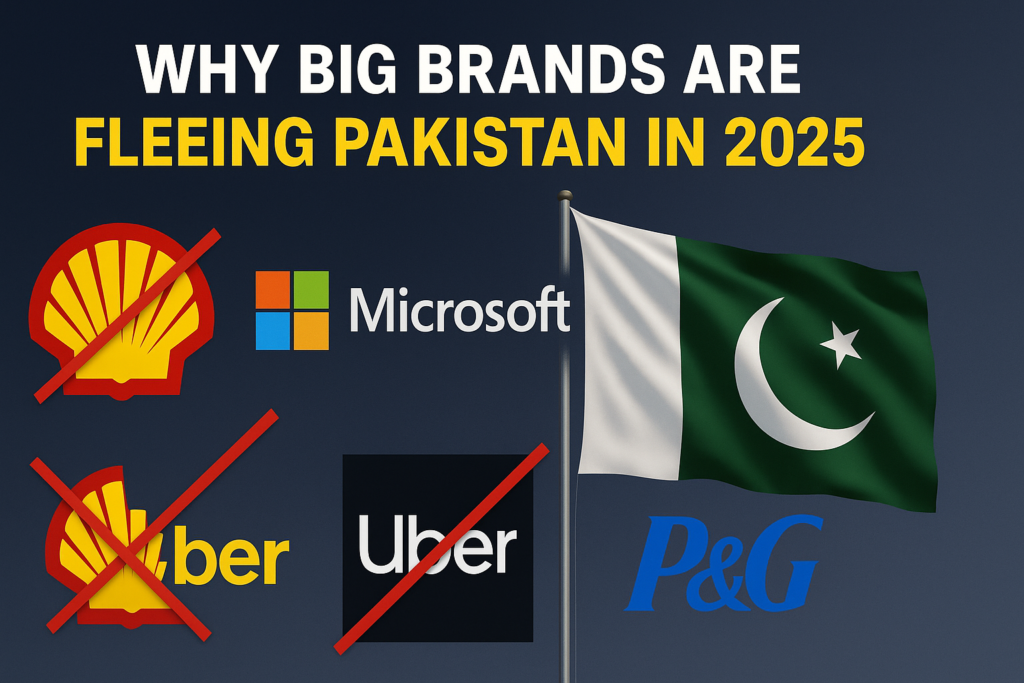
Discover why Big Brands are leaving Pakistan in 2025 — from dollar traps and tax shocks to power outages and political instability. Inside facts revealed.
🧠 Introduction
Big Brands Leaving Pakistan in 2025 is no longer a prediction—it’s a reality. Major multinational corporations like Microsoft, Shell, and Procter & Gamble have either exited or scaled back drastically. But why are these brands—who once invested billions—now abandoning a 240-million-strong market?
In this in-depth blog, we’ll explore the hidden reasons behind the corporate exodus, using real data, internal reports, and economic indicators. From profit repatriation issues to energy instability, here’s the full picture most media won’t show.
🛫 List of Big Brands Leaving Pakistan in 2025
| Brand | Sector | Exit Year | Status |
|---|---|---|---|
| Microsoft | Technology | 2025 | Operations closed after 25 years |
| Shell | Oil & Gas | 2024 | Sold assets to Saudi firm |
| Uber | Transport | 2024 | Ceased ride operations |
| Telenor | Telecom | 2023 | Sold to PTCL |
| P&G | FMCG | 2024 | Shut down major production units |
| Pfizer | Pharma | 2024 | Left due to policy hurdles |
💣 Why Big Brands Are Leaving Pakistan in 2025
1. Dollar Shortage & Profit Repatriation Issues
The State Bank of Pakistan blocked over $2 billion in earnings from being repatriated in 2023-24. This forced many companies to either halt operations or sell at a loss.
2. Policy Inconsistency
Pakistan has changed finance ministers multiple times since 2022. Foreign companies cannot plan long-term in such an unpredictable climate.
3. High Tax Burden on Corporates
Currently, MNCs in Pakistan pay 29% corporate tax, 18% sales tax, and a 10% super tax—the highest combined rates in South Asia.
4. Soaring Interest Rates
Interest rates touched 22% in 2024, making credit and operational finance too costly for multinational operations.
🧊 Hidden Reasons Most People Don’t Know
| Factor | Hidden Impact |
|---|---|
| LC Endorsement Fee (10%) | Makes importing raw materials expensive |
| Cloud Storage Law | Forced tech companies to move servers to UAE |
| 40% Illicit Trade | Legal companies lose market share to smugglers |
| Energy Shortage | Factory operations suffer 6–8 hrs daily load shedding |
📉 What This Means for Pakistan’s Economy
- Massive job loss: 40,000+ direct jobs gone
- Tech setback: Microsoft R&D, training hubs closed
- FDI impact: Inflows dropped 50% in just one year
- Inflation rises: Less competition = higher consumer prices
🌎 Where Big Brands Are Going Instead
| Country | Why It’s Preferred |
|---|---|
| UAE | No corporate tax, stable currency |
| Vietnam | Cheaper energy & labor |
| Bangladesh | Lower electricity tariffs, stable policy |
🛠 How Pakistan Can Reverse the Trend
- 🔧 Remove profit repatriation restrictions immediately
- 💡 Cut corporate tax to 25%
- ⚡ Boost energy supply & reduce industrial tariffs
- 📊 Provide stable 3-year tax policy roadmap
🤔 Frequently Asked Questions
Q1: Why is the keyword “Big Brands Leaving Pakistan 2025” important?
It reflects a larger economic crisis and helps readers understand foreign investment risks.
Q2: Are any global companies still operating in Pakistan?
Yes, but many have scaled back. New investments have paused due to FX and energy concerns.
Q3: Can Pakistan attract brands back?
Yes—but only through consistent reforms, improved ease of doing business, and strong FX reserves.
🧾 Conclusion
The wave of Big Brands Leaving Pakistan in 2025 is a clear signal. Without urgent reform in tax policy, FX controls, energy reliability, and political governance, Pakistan risks losing long-term foreign trust and capital.
If this continues unchecked, Pakistan’s economy may face not just slower growth—but global isolation.
Related read: Microsoft Exits Pakistan After 25 Years — Why Now?

